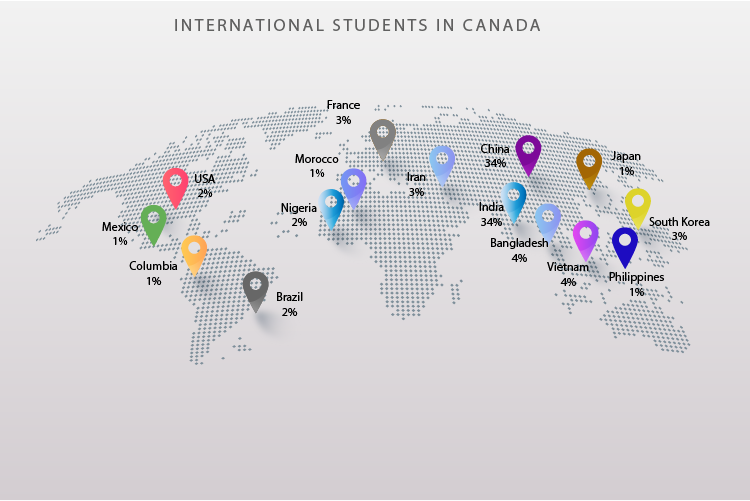
Canada is ranked in the top ten countries in the world in the Quality-of-life index . WASHINGTON, April 13, 2021 /CNW/ declared “Canada takes the top spot overall in the 2021 Best Countries Report, a ranking and analysis project by U.S. News & World Report; BAV Group, a unit of global marketing communications company VMLY&R; and the Wharton School of the University of Pennsylvania.” (www.newswire.ca, 2021).
Canada is a beautiful place to live. We embrace the stereotype term of being ‘warm and friendly’. When you come to Canada, you’ll find a welcoming country with a unique culture that embraces diversity, offering not only a beautiful landscape to live in but overall stability, multiculturalism, clean environments, and world-class healthcare, and education systems (Economist Intelligence Unit ranking of the world’s most livable cities, 2018).
International students spend over $22 Billion for their education in Canada. This significant spending is a testament of the value and quality of education they receive in Canada.

In Canada you will learn with the best and the smartest. Our educators are highly trained and bring diverse perspectives to the classroom. Canada is recognized worldwide for its outstanding quality of education—from elementary school to post-secondary studies, with more than half of its citizens between ages 25 and 64 having the status of being a postgraduate (Organization for Economic Cooperation and Development – OECD).
The Canadian Universities are multi-layered, comprehensive, and rigorous, ensuring high-quality education. International students can work while they study, off and on campus. The students can take advantage of the cooperative education and internship opportunities offered by the different Universities.
Students can evaluate whether their existing academic credentials will be accepted in Canada using www.cicic.ca, a website that provides information on education credential assessment in Canada.
Colleges are an excellent choice for international students who are more interested in applied education that is geared towards their desired profession. The smaller class sizes and hands-on learning opportunities attribute to the successful transition into their choice of career. The colleges key strength is in the variety of programs that they offer (e.g., post-graduate certificates, diplomas, bachelor’s degrees). The programs can take anywhere from a few months to four years, depending on the student time and budget. The flexibility offered can be very helpful to international students.
Canada is known for having the lowest university tuition fees for international students; it offers lower tuition than the US, the UK, and Australia. Given the excellent reputation and high quality of Canadian degrees and credentials, this affordability offers incredible value for money.

International students planning to study in Canada need to get a study permit prior to coming to Canada. Students from certain countries may require a temporary resident visa to enter Canada and others from a non-visa- exempt country may require a visitor visa. For those taking courses shorter than six months may not require a study visa. For more details, please consult
https://www.canada.ca/en/immigration-refugees-citizenship/services/study-canada.html
All international students should consult the web resource listed and the Canadian diplomatic mission in their home country to confirm what documentation is required to study in Canada.
International students can work during their studies on and off campus and through the Co-op Work Permit Program. In addition, the Post Graduation Work Permit Program provides work opportunities upon graduation for students who have graduated from participating Canadian institutions.
Some International students may be interested in staying on permanently in Canada after they graduate. There are many programs that are available to students after completing their studies in Canada to apply to become permanent residents. Please consult http://www.cic.gc.ca
For most International students the idea of studying in Canada will be exciting, fun and filled with trepidation. For many students they are bound to encounter some degree of culture shock. This is to be expected, but there are also ways to minimize the stress from this emotional transition.
There are some essential points to gear yourself towards a smooth transition:

International students arriving in Canada should have either; already arranged accommodation or staying at temporary residence (friends, family hotel, hostel etc.) Some of the things that you should have in place include but are not limited to are:
Transportation:
Types of accommodation:
It is the responsibility of the student to organize their accommodation. The initial step would be to contact the housing and residence office at the educational Institute that they will be attending.
However, much you read and prepare yourself before travelling to Canada you will most definitely face culture shock at some time during your stay in Canada. Rest assured many of the stereotypes you hear about Canadians are true! We are friendly, warm, and welcoming. Canadians ask questions and love learning about other cultures. We love long stories.
Canada is an incredible country where thousands of students have studied safely and happily.
There are some bumps that you will go through as an international student.
International students generally receive support from their universities, international student advisors, study skills programs, career counselling and other programs. Most of the bumps listed above are easily negotiable and the student can overcome their challenges and adjust and enjoy their stay in Canada.
There are many support services on campus for you. International student office will often organize trips and activities to students to get to know other students and see more of your new city and country. During these trips students should learn about their neighbourhood where all the essential services are, supermarkets, post office, bus services, medical clinics etc.
MultiCulturalism is a fundamental Value in Canada. Canada welcomes everyone, we value different cultures, ages, religions, abilities, and talents.
Don’t be afraid to ask questions. Know where your International Student office is. Speaking in the local language will give you confidence. Read about the people, customs, sports, food, and fashion in the city where you will be living. Canada has four distinct seasons, if you have never experienced snowfall or spring flowers blooming this will be a treat for you.
Don’t forget to keep in touch with your own culture. Try and find a store that stocks your favorite foods from home. This will help with homesickness and reverse culture shock when you return home.
WhatsApp us